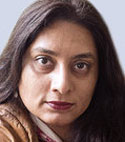
By Bina Shah
April 28, 2016
In January a horrifying story emerged from Afghanistan, about the mutilation of a 20-year-old woman named Reza Gul. She had objected to her husband’s taking a 6- or 7-year-old niece as his second wife; the husband retaliated by cutting off her nose with a pocketknife, and then fled.
As government officials, human rights organizations, and even the Taliban condemned the attack, Reza Gul became the newest example of failed promises to liberate Afghan women from the tyranny of the Taliban and, by extension, many Afghan men. Yet these promises were flawed from the beginning.
Afghan women’s rights activists as well as activists outside Afghanistan known as intersectional feminists, who by definition understand how complex the oppression of women can be, often say that Western feminists have wilfully misrepresented the plight of Afghan women; Spogmai Akseer has even written that a portrayal of them as “silent and passive victims of their culture, their men and their politics” has served only to justify an imperialist invasion disguised as a humanitarian rescue mission.
Lina Abirafeh, a specialist on gender-based violence who worked in Afghanistan from 2002 to 2006, concluded that aid programs there had ignored a basic problem: Aiming them at women alone, without also addressing men, might complicate the political quest for women’s rights. Indeed, the continuing violence against women has been fuelled in great part by resentment from men — and many women — over a speedy agenda for change that they see as forced upon them by outsiders.
Both of those analyses point to a huge gap between how Westerners have understood the experience of Afghan womanhood, and how Afghan women see themselves. In fact, the self-image of a great many Afghan women doesn’t match the victimhood awarded them by Western aid workers. They see themselves instead as brave, capable and strong. Islam is important to them, as is their honour. They want more freedoms, of course, but they want to be active participants in their own liberation and set their own pace for the struggle.
Ms. Abirafeh contends that Afghan women have always been conscious of their suffering, but take offense at the idea that they need foreigners to intervene on their behalf. The writer and lawyer Rafia Zakaria argues that “imperial interventions” are unable to “produce the ground-level moral shifts that must occur within Afghanistan to make its women safe.”
Shortly before the attack on Reza Gul, an Afghan filmmaker named Sahraa Karimi spoke in Karachi. She said development workers grew rich on “women’s empowerment projects” and “minority interest projects” while many female Afghan intellectuals left the country in a debilitating brain drain. It is just too hard for them to endure the dangerous working conditions and suffocating social environments outside Afghanistan’s fortified Western compounds. Yet she insisted that other Afghan women are now able to speak out for themselves, with the help of supportive international organizations. Workshops and training have enabled them to tell their own stories of their suffering, on their own terms, instead of having Westerners speak on their behalf.
I must confess that I, too, have made the mistake of seeing Afghan women through a narrow prism. In 1996, alarmed by news of their status under the Taliban, I wrote a short story that focused on their Burqas and their enforced imprisonment in the home. In the final twist I revealed that I was actually talking about a future that might unfold in Pakistan if we ignored the plight of our Afghan sisters. I look back now and wonder how I had written that story without ever having met a real Afghan woman.
That didn’t happen until 2013, when I travelled to Konya, Turkey, for a conference on the poetry and life of the Sufi mystic Rumi. Our delegation included two young Afghan women. One, gentle and reserved, was the director of a cultural house in northern Afghanistan and the editor of its monthly magazine. She was studying Dari literature at a university, had done extensive research on Rumi, and had compiled youth poetry written in the Dari language. The second woman was a fiery and outspoken poet who wrote for a feminist newspaper and managed a radio station.
These two were no victims, no poster children for invasion, even though they’d come to Konya through a foreign grant, and their projects at home were funded by international organizations. They were just like I had been in my 20s — studying, working, and building a life for themselves. They kept their hair covered at all times; the scholar with a light scarf, the poet with colourful turbans and head wraps. But they argued and debated, laughed and sang with all of us as we made our way from Konya to Cappadocia.
One day our delegation visited a tiny cave church that inspired reverence under the weight of its ancientness. When we emerged into bright daylight, the poet leapt onto a stone ledge above our heads and recited lines from Rumi while the rest of us stood below, entranced. Her eyes blazed with passion, her head was held high and proud. In the sunlight, among the flowers and rocky outcrops, she was vibrant, alive and free.
I am still in touch with both women, and I watched proudly last year as the poet was elected to her provincial council. Later, I found out she had married. I wrote to congratulate her on taking this brave step — a bet for the future, based on optimism and on trust in the Afghan man she’d chosen to share her life with.
“Thank you,” she wrote back. “I have started a new life, with love.”
Bina Shah is the author of several books of fiction, including, most recently, “A Season for Martyrs”
Source: nytimes.com/2016/04/29/opinion/afghan-women-what-the-west-gets-wrong.html?




 Moderate Islamist here
Moderate Islamist here


0 comments:
Post a Comment